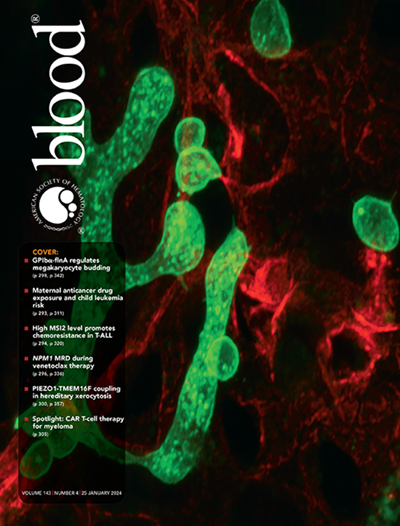谷氨酰胺代谢重编程提高BCMA-CART细胞适应度和多发性骨髓瘤的治疗效果。
IF 23.1
1区 医学
Q1 HEMATOLOGY
引用次数: 0
摘要
癌细胞的谷氨酰胺依赖性降低了局部谷氨酰胺的可用性,从而阻碍了抗肿瘤t细胞的功能并促进了免疫逃避。因此,我们推测谷氨酰胺剥夺可能会限制CAR - t细胞治疗在癌症患者中的疗效。我们已经看到,当谷氨酰胺浓度有限时,抗原特异性T细胞在抗原刺激下无法增殖或产生IFN-γ。使用多发性骨髓瘤(MM)作为谷氨酰胺依赖性疾病模型,我们发现选择性靶向MM细胞中BCMA的小鼠CAR-T细胞对谷氨酰胺剥夺敏感。然而,通过谷氨酰胺转运蛋白Asct2的表达来增加谷氨酰胺摄取的CAR-T细胞,即使在低谷氨酰胺浓度的条件下,也表现出增强的增殖和对抗原刺激的反应性,增加的IFN-γ的产生和增强的细胞毒性活性。机制上,Asct2过表达通过上调mTORC1基因特征,修改溶质载体转运体(SLC)库,提高基础耗氧量和糖酵解功能,从而增强CART细胞在体内的持久性,从而重新编程CART细胞的代谢适应性。因此,Asct2的表达增加了BCMA-CART细胞在同源和基因工程小鼠MM模型中的作用,延长了小鼠的存活时间。在患者中,MM细胞Asct2表达降低预示着联合免疫治疗和BCMA-CAR - t细胞治疗的不良结果。我们的研究结果表明,重编程谷氨酰胺代谢可能会增强MM中抗肿瘤CAR -t细胞的功能。这种方法也可能对其他依赖谷氨酰胺作为关键能量来源和代谢标志的癌症有效。本文章由计算机程序翻译,如有差异,请以英文原文为准。
Reprogramming glutamine metabolism enhances BCMA-CART cell fitness and therapeutic efficacy in multiple myeloma.
Glutamine-dependence of cancer cells reduces local glutamine availability, which hinders anti-tumor T-cell functionality and facilitates immune evasion. We thus speculated that glutamine deprivation might be limiting efficacy of CAR T-cell therapies in cancer patients. We have seen that antigen-specific T cells are unable to proliferate or produce IFN-γ in response to antigen stimulation when glutamine concentration is limited. Using multiple myeloma (MM) as a glutamine-dependent disease model, we found that murine CAR-T cells selectively targeting BCMA in MM cells were sensitive to glutamine deprivation. However, CAR-T cells engineered to increase glutamine uptake by expression of the glutamine transporter Asct2 exhibited enhanced proliferation and responsiveness to antigen stimulation, increased production of IFN-γ, and heightened cytotoxic activity, even under conditions of low glutamine concentration. Mechanistically, Asct2 overexpression reprogrammed CART cell metabolic fitness of CART cells by upregulating the mTORC1 gene signature, modifying the Solute Carrier transporter (SLC) repertoire, and improving both basal oxygen consumption rate and glycolytic function thereby enhancing CART cell persistence in vivo. Accordingly, expression of Asct2 increased the efficacy of BCMA-CART cells in syngeneic and genetically-engineered mouse models of MM, which prolonged mouse survival. In patients, reduced expression of Asct2 by MM cells predicted poor outcome to combined immunotherapy and BCMA-CAR T-cell therapy. Our results indicate that reprogramming glutamine metabolism may enhance anti-tumor CAR T-cell functionality in MM. This approach may also be effective for other cancers that depend on glutamine as a key energy source and metabolic hallmark.
求助全文
通过发布文献求助,成功后即可免费获取论文全文。
去求助
来源期刊

Blood
医学-血液学
CiteScore
23.60
自引率
3.90%
发文量
955
审稿时长
1 months
期刊介绍:
Blood, the official journal of the American Society of Hematology, published online and in print, provides an international forum for the publication of original articles describing basic laboratory, translational, and clinical investigations in hematology. Primary research articles will be published under the following scientific categories: Clinical Trials and Observations; Gene Therapy; Hematopoiesis and Stem Cells; Immunobiology and Immunotherapy scope; Myeloid Neoplasia; Lymphoid Neoplasia; Phagocytes, Granulocytes and Myelopoiesis; Platelets and Thrombopoiesis; Red Cells, Iron and Erythropoiesis; Thrombosis and Hemostasis; Transfusion Medicine; Transplantation; and Vascular Biology. Papers can be listed under more than one category as appropriate.
 求助内容:
求助内容: 应助结果提醒方式:
应助结果提醒方式:


